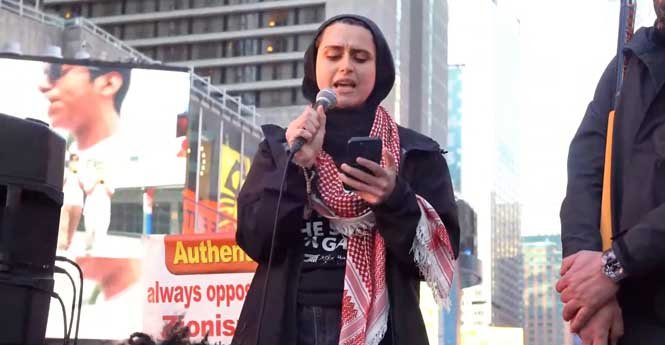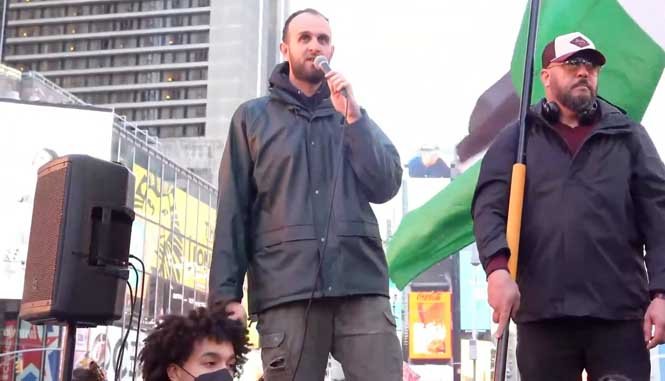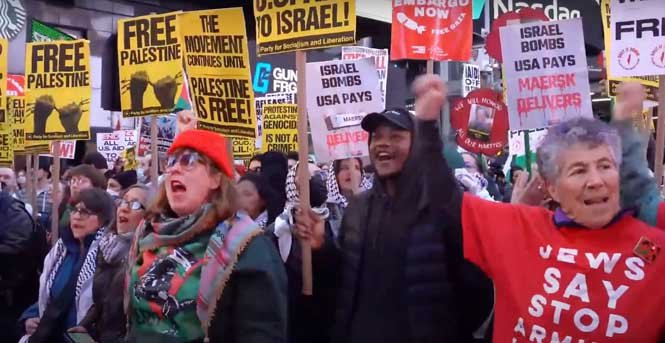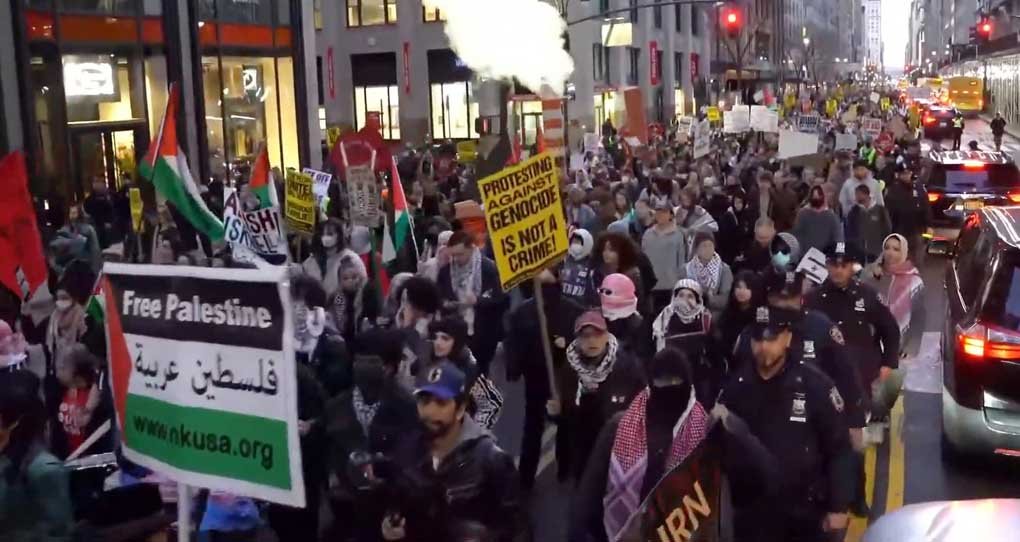Introduction
The streets of Manhattan echoed with chants of “Free Palestine” and “Ceasefire Now” on Saturday as tens of thousands of protesters flooded Times Square, marching toward the United Nations headquarters. The demonstration, one of the largest pro-Palestine rallies in recent U.S. history, unfolded against a backdrop of escalating violence in Gaza and growing global pressure for a diplomatic resolution. Organized by a coalition of activist groups, including the Palestinian Youth Movement and Jewish Voice for Peace, the protest highlighted deepening domestic divisions over U.S. foreign policy while amplifying calls to end military aid to Israel.
The Protest Unfolds: A Sea of Flags and Fury
Protesters covered in keffiyehs and waving Palestinian flags turned Midtown into a vivid scene of opposition under a cloudless fall sky. While drumbeats interspersed statements against the Israeli military’s shelling of Gaza, signs saying “End the Occupation” and “Stop Funding Genocide bobbed above the crowd.” The New York Times reports that although organizers claimed numbers exceeded 50,000, the NYPD calculated attendance at almost 20,000.
The march began at Times Square, where 25-year-old organizer Aisha Rahman took the stage, her voice cracking as she described losing cousins in an airstrike. Declaring, “This is about humanity, not politics,” she urged the United States to stop its yearly $3.8 billion military aid program to Israel. Later on, a Reuters story verified that, according to the Gaza Health Ministry, the dead toll in Gaza has exceeded 34,000 with about 70% being women and children.

Voices from the Crowd: Grief, Hope, and Resistance
Amid the throng, personal stories painted a visceral picture of the conflict’s human toll. Maria Gonzalez, a Brooklyn nurse, held a poster of her Gazan pen pal, 12-year-old Ahmed, killed in October. “He loved soccer and mangoes. He wasn’t a threat,” she said, tears streaming. Nearby, 68-year-old Holocaust survivor David Stein stood with a “Not in Our Name” sign. “Never again means never again for anyone,” he told The Guardian.
The protest also drew criticism. A smaller counter-demonstration near Rockefeller Center, organized by pro-Israel groups, accused rally-goers of ignoring Hamas’ role in the conflict. “Where’s the outrage for Israeli hostages?” shouted protester Rachel Cohen, referencing the 120 captives still held in Gaza. The Associated Press noted sporadic shouting matches but no arrests.
Political Context: U.S. Policy Under Scrutiny
The rally intensified scrutiny on President Biden’s stance. While the administration recently approved a $26 billion aid package for Israel, protesters demanded a reversal. “Funding bombs isn’t neutrality—it’s complicity,” argued Columbia University student Layla Hassan during her speech.
According to Axios, the White House faces mounting pressure from progressive Democrats to condition aid on Israel adhering to international law. Meanwhile, Senate Republicans introduced a bill this week to sanction the International Criminal Court over its probe into alleged Israeli war crimes—a move Politico claims could further alienate young voters.
Internationally, the protest mirrored global outcry. Hours earlier, the UN General Assembly voted 143-9 to back Palestine’s bid for full membership, a symbolic win celebrated by marchers. Yet, as Al Jazeera highlighted, the U.S. retains veto power in the Security Council, leaving statehood efforts in limbo.

Humanitarian Crisis: The Rallying Cry for Aid
Central to the protest was the demand for unfettered humanitarian access to Gaza, where the UN warns famine is “imminent.” Sarah El-Tawil, a medical volunteer recently returned from Rafah, described hospitals overwhelmed by trauma cases. “Kids are dying from infections, not just bombs,” she told BBC.
While the U.S. spearheaded a temporary pier for aid delivery, critics argue it’s insufficient. “Aid shouldn’t come by sea when land routes are blockaded,” said Rep. Alexandria Ocasio-Cortez in a tweet read aloud at the rally.
Implications: A Turning Point for U.S. Foreign Policy?
Analysts suggest the protest signals a generational shift. “Young voters see Palestine through the lens of racial justice and anti-colonialism,” explained Georgetown University professor Marc Lynch in Foreign Policy. With 62% of Democrats now opposing unconditional aid to Israel (Pew Research), Biden’s 2024 campaign risks backlash unless rhetoric evolves.
Meanwhile, the movement’s diversity—Black Lives Matter leaders, LGBTQ+ groups, and labor unions—underscores its broadening appeal. “Our struggles are interconnected,” said Black activist Malik Johnson, linking police brutality to militarized occupation.

What’s Next: From Streets to Ballot Boxes
Organizers vow sustained action, with plans for campus walkouts and a “Day of Resistance” voter registration drive. Yet divisions persist. While some advocate for dialogue, groups like Within Our Lifetime push to “dismantle Zionism entirely,” exposing ideological rifts.
As the sun set, protester Amina Yusuf, whose family remains in Gaza, summarized the day’s mix of exhaustion and resolve: “We’ll keep shouting until the world listens.”
Conclusion
Saturday’s protest underscored the growing potency of Palestine solidarity in shaping U.S. discourse. As the 2024 election looms, the Biden administration’s response—or lack thereof—could redefine America’s role in a conflict with no end in sight. For now, the streets of New York have spoken, blending grief with a demand for justice that echoes far beyond city limits.
Related Video:
Source Attribution:
- The New York Times: Estimated protest attendance figures and on-the-ground coverage.
- Reuters: Verified Gaza death toll statistics from the Gaza Health Ministry.
- The Guardian: Interview with Holocaust survivor David Stein and counter-protest dynamics.
- Associated Press: Reports on clashes between pro-Palestine and pro-Israel demonstrators.
- Axios: Analysis of U.S. legislative debates over military aid to Israel.
- Politico: Details on Senate Republicans’ proposed ICC sanctions bill.
- Al Jazeera: Context on the UN General Assembly vote for Palestinian statehood.
- BBC: Insights into Gaza’s humanitarian crisis from medical volunteer Sarah El-Tawil.
- Foreign Policy: Commentary on shifting generational views toward Palestine.
- Pew Research: Polling data on U.S. voter sentiment regarding Israeli aid.
Explore More:
- Houthis Dig In As U.S. Airstrikes In Yemen Spark War Fears
- Yemen’s Houthis Remain Defiant Following U.S. Airstrikes
- Gaza Gripped by Fear as Airstrikes Shatter Ceasefire Hopes
- UN Official Urges De-escalation Amid Rising Tensions in Yemen, Israel, and the Red Sea

